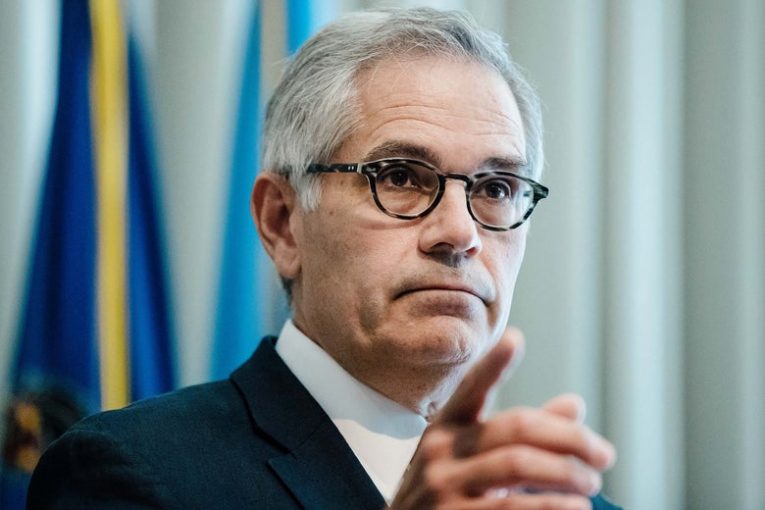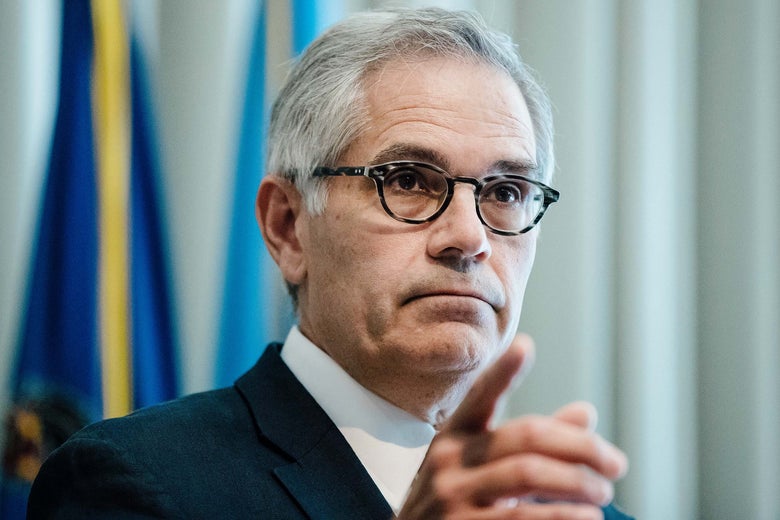

By Alana Bleimann and Sally Kim
PHILADELPHIA – Declared a “rogue” and “radical” prosecutor by many, Larry Krasner is demonstrating what some call mercy and understanding to thousands of Philadelphia residents in order to reform the justice system and improve community life.
Some critics disagree with a DA who has proven he subscribes to being a “progressive prosecutor.”
Elected in November of 2017, and sworn in a few months later as the 26th District Attorney of Philadelphia, Krasner immediately began implementing policies that would turn heads and raise questions – is he too radical and are these policies in the best interest of the community were only a few thoughts raised.
Born in St. Louis and growing up in Philadelphia, Krasner was well-educated as he pursued his undergraduate studies at the University of Chicago and graduate work at Stanford Law School.
After Stanford University, Krasner opened his own law firm and worked as a criminal defense lawyer in Philadelphia concentrated on preserving civil rights and giving his clients just representation in an often unfair system.
In order to reform what believed to be a broken system, he ran for District Attorney in his home city against federal prosecutor Joe Khan. And won by almost 18 percent.
According to his official campaign website, Krasner planned to implement the following policies in his first few months of title: End mass incarceration, Focus on serious crime, Stand up for  individual rights and liberties and Actively resist the Trump Administration
individual rights and liberties and Actively resist the Trump Administration
These four focuses seem noble at first glance, but what has Krasner actually done to support these ideas since 2017?
In order to work towards the end of mass incarceration, Krasner rolled out a series of internal policies: seeking shorter sentences, diverting low-level offenses from the justice system, and charging crimes at a lower level.
He sent out a memo in March of 2018 outlining his policies. A few of them were truly new.
One of them focused on criminal-justice circles where each time a prosecutor wanted to send someone to prison, they had to calculate the cost of the imprisonment, state it aloud in court, and explain the “unique benefits” of the punishment.
Krasner has also decriminalized marijuana possession and some prostitution offenses and made bail reforms. He’s also overhauled the entire office’s charging procedures, even for gun and violent offenses.
Some of Krasner’s actions have fallen short.
Despite claims that his office is working to end cash bail, court watchers have observed assistant district attorneys consistently request cash bail for people who cannot afford to pay, even in the midst of the COVID-19 pandemic.
Krasner also funneled an increased number of gun cases to a court diversionary program called Accelerated Rehabilitative Disposition. He sent 78 compared to 12 the previous year and this is matters because criminals who use guns tend to use them again and come back to prison.
Some describe Krasner’s actions of cutting plea deals for violent criminals and petitioning the court to vacate a death sentence for a convicted murderer as “pursuits motivated not by law but by ideology” and that “prosecutors who, like Krasner, choose not to follow the law undermine crime victims, embolden criminals, and put innocent people at risk.”
Krasner is looking beyond mass incarceration and focusing on the next step.
“One of our big priorities this year is to try to address mass supervision — which, of course, would be both probation and parole,” noting that mass incarceration begins at the hands of law enforcement who enforce policies that are in place to keep the cycle of discrimination and mistrust alive.
Considered to be one of the more timely movements and calls for justice, in relation to the Black Lives Matter Movement and the call for police reform and wealth distribution, Krasner took immediate action in his home state.
At the scene of just one George Floyd and Black Lives Matter protest in July of last year, Philadelphia’s SWAT officer Richard P. Nicoletti became violent, spraying multiple protestors in the face with pepper spray as they knelt on the road, peacefully protesting.
Krasner did not take his time with prosecution.
Nicoletti was charged with simple assault, reckless endangerment, official oppression, and possession of an instrument of crime at the hands of Krasner.
“There’s going to be justice that is even-handed and no longer at the service of politics,” Krasner stated when he received backlash from many, upholding his effort to reform the system by holding law enforcement officers accountable for their unlawful and harmful actions.
In his upcoming 2021 election battle against Carols Vega, an ex-homicide prosecutor, Krasner believes he will secure a repeat victory, continuing to refuse to kneel at the feet of critics and remain hard-headed, confident that he can spearhead the movement towards real systematic change.
 Alana Bleimann is a junior at the University of San Francisco majoring in Sociology with a minor in Criminal Justice Studies. She is from Raleigh,
Alana Bleimann is a junior at the University of San Francisco majoring in Sociology with a minor in Criminal Justice Studies. She is from Raleigh,  North Carolina.
North Carolina.
Sally Kim is a senior at UCLA, majoring in Sociology. She is from the East Bay Area.
To sign up for our new newsletter – Everyday Injustice – https://tinyurl.com/yyultcf9
Support our work – to become a sustaining at $5 – $10- $25 per month hit the link: